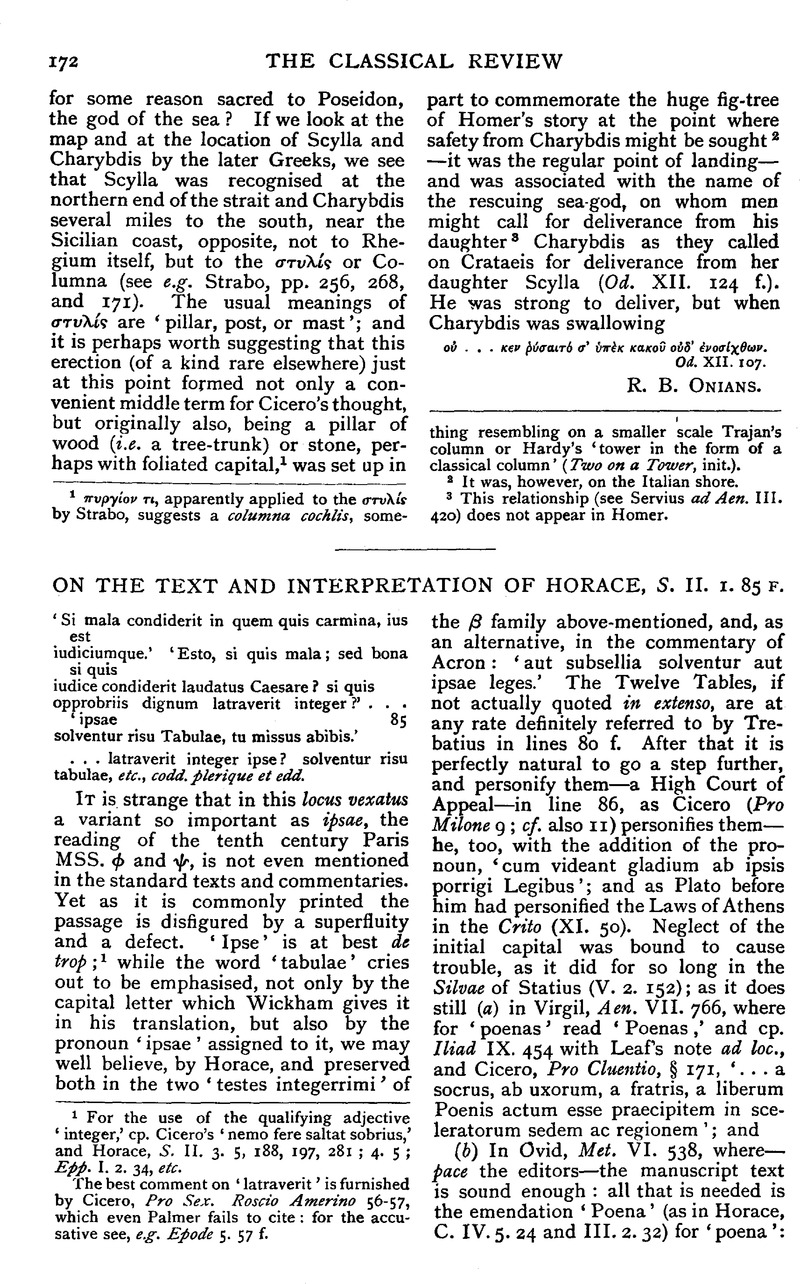No CrossRef data available.
Article contents
On the Text and Interpretation of Horace, S. II. 1. 85 F
Published online by Cambridge University Press: 27 October 2009
Abstract

- Type
- Review Article
- Information
- Copyright
- Copyright © The Classical Association 1927
References
page 172 note 1 For the use of the qualifying adjective ‘integer,’ cp. Cicero's ‘nemo fere saltat sobrius,’ and Horace, S. II. 3. 5, 188, 197, 281; 4. 5; Epp. I. 2. 34, etc. The best comment on ‘latraverit’ is furnished by Cicero, Pro Sex. Roscio Amerino 56–57, which even Palmer fails to cite: for the accusative see, e.g. Epode 5. 57 f.
page 173 note 1 For the collocation of words, cp. ‘di me terrent et Iuppiter hostis,’ Aen. XII. 895; and for the feminine ‘hostis,’ Ovid, A.A. II. 461, and Her. VI. 82.
page 173 note 2 Obviously the words ‘bona (carmina)’ in the passage before us (II. 1. 83) constitute an epitome of the stylistic qualities dealt with in full at I. 10. 7 ff.
page 173 note 3 As Horace makes the XII Tables laugh, so Lucretius makes his atoms laugh, I. 919 f and II. 976 ff.
page 173 note 4 Cp. Epp. II. 1. 23 f. and 152 ff., ‘Tabulas peccare vetantis quas bis quinque viri sanxere,’ etc.; and see Wordsworth, , Fragments and Specimens of E.L., pp. 259 f.Google Scholar, with Palmer's comment on our passage.
page 173 note 5 So, in the literal sense, at C. I. 4. 1 and 10; 9. 5: ‘Solvitur acris hiems grata vice,’ etc. Cp. the metaphorical use of ‘regelare’ in Seneca and Martial, whose ‘rigidi Catones’ (X. 20 [19] 21) are the analogue of Horace's ‘rigidus Niphates’ (C. II. 9. 20). But with a word like ‘solvere’ it is dangerous to dogmatise. Thus a comparison of Virgil's usage in such passages as Aen. I. 92; XII. 951 and 867, ‘illi membra novus solvit formidine torpor’ (see also perhaps ib. IV. 55, IX. 236, and X. 305, ‘solvitur,’ ‘breaks up,’ ‘goes to pieces’ of a ship), suggests that here as elsewhere ‘solvere’ stands for the Greek λειν, and means simply ‘unstring’ (λσε δ γυῖα), ‘overcome,’ ‘put out of action’—a metaphor almost equally apt and effective. The ablative is presumably not modal, but instrumental, as in Seneca, Epp. 78. 18, ‘non vincetur dolor ratione, qui victus est risu’; cf. the Homeric γλῳ ἔκθανον of Odyssey XVIII. 100.
page 174 note 1 ‘H. B.’ in the Sunday Times, July 10, 1927; see also MrKipling's, Rewards and Fairies, P. 77.Google Scholar


